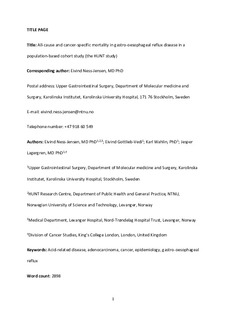All-cause and cancer-specific mortality in GORD in a population-based cohort study (the HUNT study)
Journal article, Peer reviewed
Accepted version

View/
Date
2018Metadata
Show full item recordCollections
Abstract
Objective Gastro-oesophageal reflux is a public health concern which could have associated oesophageal complications, including adenocarcinoma, and possibly also head-and-neck and lung cancers. The aim of this study was to test the hypothesis that reflux increases all-cause and cancer-specific mortalities in an unselected cohort.
Design The Nord-Trøndelag health study (HUNT), a Norwegian population-based cohort study, was used to identify individuals with and without reflux in 1995–1997 and 2006–2008, with follow-up until 2014. All-cause mortality and cancer-specific mortality were assessed from the Norwegian Cause of Death Registry and Cancer Registry. Multivariable Cox regression was used to calculate HRs with 95% CIs for mortality with adjustments for potential confounders.
Results We included 4758 participants with severe reflux symptoms and 51 381 participants without reflux symptoms, contributing 60 323 and 747 239 person-years at risk, respectively. Severe reflux was not associated with all-cause mortality, overall cancer-specific mortality or mortality in cancer of the head-and-neck or lung. However, for men with severe reflux a sixfold increase in oesophageal adenocarcinoma-specific mortality was found (HR 6.09, 95% CI 2.33 to 15.93) and the mortality rate was 0.27 per 1000 person-years. For women, the corresponding mortality was not significantly increased (HR 3.68, 95% CI 0.88 to 15.27) and the mortality rate was 0.05 per 1000 person-years.
Conclusions Individuals with severe reflux symptoms do not seem to have increased all-cause mortality or overall cancer-specific mortality. Although the absolute risk is small, individuals with severe reflux symptoms have a clearly increased oesophageal adenocarcinoma-specific mortality.